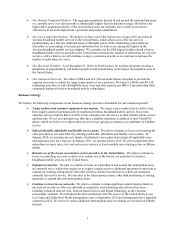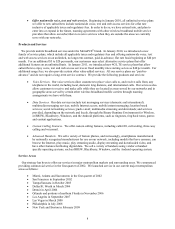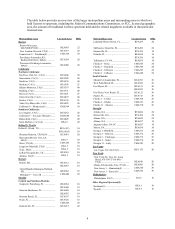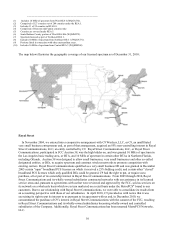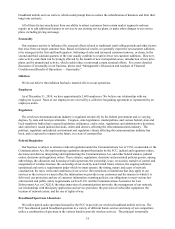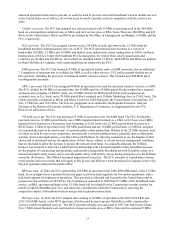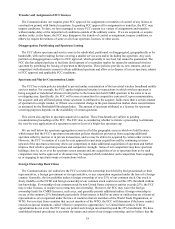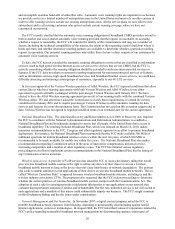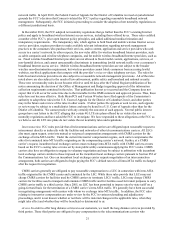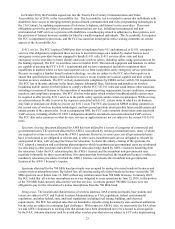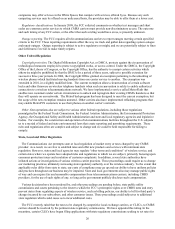Metro PCS 2010 Annual Report Download - page 26
Download and view the complete annual report
Please find page 26 of the 2010 Metro PCS annual report below. You can navigate through the pages in the report by either clicking on the pages listed below, or by using the keyword search tool below to find specific information within the annual report. 16
channels were auctioned on a REAG basis. MEAs are a collection of EAs. Under the recently adopted rules, WCS
licensees are subject to revised construction requirements.
Future allocations. The FCC has certain broadband wireless spectrum allocation proceedings in process. For
example, the FCC is considering service rules for an additional 20 MHz of paired AWS spectrum, or AWS-2, in the
1915-1920 MHz, 1995-2000 MHz, 2020-2025 MHz and 2175-2180 MHz bands, as well as 20 MHz of unpaired
AWS spectrum, or AWS-3, in the 2155-2175 MHz band. The FCC also is considering whether the unpaired AWS-3
spectrum could be paired in either a symmetrical or asymmetrical basis with other spectrum to create more paired
spectrum. Both AWS-2 and AWS-3 have been allocated for advanced fixed and mobile services, including AWS.
As noted above, the FCC also is seeking further comment on service rules for the 700 MHz D Block. The FCC and
interested parties have proposed that these blocks of spectrum be subject to various conditions, configurations and
terms and conditions.
In 2010, the FCC released its National Broadband Plan, which indicates that the FCC will seek to allocate 300 to
500 MHz of additional spectrum below 2.5 GHz, over the next 5 to 10 years, for use in providing mobile wireless
broadband services. The FCC also is taking additional steps to repurpose spectrum for mobile wireless broadband
use, including seeking authority from Congress to conduct incentive auctions designed to encourage licensees of
previously assigned spectrum, including digital broadcast television spectrum, to make such spectrum available for
mobile wireless broadband services. Recently, the FCC has initiated a series of proceedings designed to identify
additional spectrum that can be refarmed, reassigned, or reallocated to meet a perceived need for an additional
significant amount of spectrum for wireless broadband mobile services. For example, one of these proceedings is a
Notice of Inquiry, or NOI, in which the FCC proposes to conduct voluntary incentive auctions for spectrum
currently used for digital broadcast television services. The FCC also has initiated a Notice of Proposed
Rulemaking, or NPRM, and NOI regarding the regulatory flexibility of 90 MHz of mobile satellite service, or MSS,
spectrum. This satellite spectrum, along with the ancillary terrestrial component, or ATC, that has been granted to
most MSS licensees, may also be used to provide mobile wireless broadband services. Despite these government
initiatives to identify and allocate additional spectrum for mobile wireless broadband services, the fact remains that
there is, at present, a spectrum shortage and there do not appear to be any easy near term solutions. There is no
certainty as to whether such additional spectrum will be made available, the amount of spectrum which might
ultimately be made available, the timing of the auction of any such spectrum, whether Congress will enact
legislation enabling incentive auctions, the process for clearing incumbent users, the likely configuration of, and
conditions that might apply to, any such additional spectrum, or the usability of any of this spectrum for wireless
services competitive with our services or by us. In addition, the National Telecommunications and Information
Administration, or NTIA, has issued a report identifying 155 MHz of spectrum for fast track evaluation and sets a
timetable for making a total of 500 MHz of spectrum available through government coordination and reallocation.
Further, Congress may pass legislation or the federal government may undertake actions or proceedings in the future
to reallocate spectrum from government use to private commercial use for mobile wireless broadband services or to
change the rules relating to already licensed spectrum, which may allow new or existing licensees to provide
services comparable to the services we provide.
License term
The broadband PCS licenses held by us have an initial term of ten years, our AWS licenses have an initial license
term of fifteen years, and our 700 MHz license has an initial term of ten years from June 12, 2009. If we fail to meet
an initial construction benchmark in June of 2013 for our 700 MHz license, the license term will be shortened to
June of 2017, and we may be subject to fines and forfeitures and/or a reduction of our licensed service area. In
addition, if we fail to meet the build out requirements by the end of the license term for our 700 MHz license, we
will lose our authority to serve any unserved area within our 700 MHz license area and could be subject to fines and
forfeitures, including a revocation of our 700 MHz license. Each FCC broadband spectrum license is material to our
ability to operate and conduct our business in the area covered by that license. We also have other licenses, such as
microwave licenses, which we use to backhaul traffic from our cell sites to our switch locations.
Subject to applicable conditions, all of our licenses may be renewed at the end of their terms. Our initial
broadband PCS licenses for San Francisco, Sacramento, Miami and Atlanta were granted in 1997, were renewed in
2007 and are subject to renewal in January 2017; our AWS licenses were granted in November 2007 and are subject
to renewal in November 2021; and our 700 MHz license was granted in June 2008 and is subject to renewal in June
2019. We intend to file renewal applications for our licenses when the renewal filing windows open. The next
wireless broadband PCS license that needs to be renewed expires in 2011.



